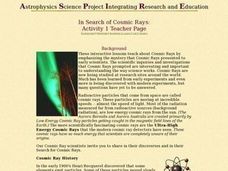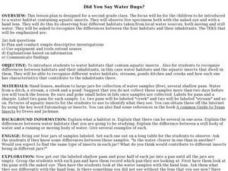Curated OER
Plant Motion: The Untold Secrets
Students identify and categorize knowledge needed to design an experiment. They observe, recognize and describe the motion viewed. They document any changes caused by various solutions.
Curated OER
Education Academy
Students identify the key issues and critical concerns associated with environmental ethics for the 21st century. They articulate their role and personal responsibility with respect to the earth and its systems. Students explore and...
Curated OER
Live Well Now to Live Longer Later
Ninth graders select a topic to research, completing the sentence, "Are the effects of _______ really that detrimental to one's health?" They record information in a journal, including sources of information. Students work in groups with...
Curated OER
Weather Predictions
Fourth graders explore meteorologists. They explore symbols on a weather map and make five day forecasts.
Curated OER
Blocks And Screws (or "screwy Contrivances")
Students, given a block of wood and a screw or nail, are asked to put that screw or nail into a block. They examine how many contrivances and other imperfections found in living things are best explained by the process of evolution.
Curated OER
Graphing Water Temperature
Learners graph water temperature using probe software and a Palm on a class field trip to a lake or pond. Emphasis is placed on collaboration with high school science students and the use of ImagiProbe software.
Curated OER
Polluted Soil
Students take plants of their own choice and pollute the soil with a pollutant of their own choice or one assigned by the teacher. They regularly record observations such as plant growth, health, and soil pH.
Curated OER
Forces Cause Change
Third graders will gain recognition that physical relationships affect each other and that change occurs when one object acts upon another.The teacher will recognize ways in which technology can be used to enhance the understanding of...
Curated OER
Creating The Virtual Model
High schoolers engage in a instructional activity that is about the concept of earthquake design. The instructional activity includes the integration of technology and how it can be used to create buildings and structures for...
Curated OER
Polar Day: Living in the Canadian North
Students study the Canadian North. In this Canadian North lesson, students study the physical characteristics and the lifestyles of people in that region. Students complete map making and creative activities that help them learn about...
Curated OER
CEEN Power
Students identify the different types of measurements used in industry. In this technology lesson plan, students investigate how much power CEENBoT has. They collect data and graph results.
Curated OER
Weather Myths
Fourth graders relate myths to weather phenomenon. They write and illustrated a weather myth and present it to the class.
Curated OER
How Can We Extract Human DNA?
Students perform an experiment in which they extract DNA samples from hair samples. They follow a set procedure to extract the DNA and complete summary questions.
Curated OER
Devising a Set of Experiments to Test Water for Dissolved Substances
Students work together to test water samples for pollutants. They design data tables to collect and record their observations. They complete discussion questions to end the lesson.
Curated OER
Achieving Valued Roles "Compendium Version"
Students discuss the term initiating a conversation which means you make statements to begin a discussion with another person. They discuss if you initiate a conversation, then you have to tell the other person that you would like to...
Curated OER
Hawaiian Bowl!
Students describe the movement of tectonic plates in the Hawaiian archipelago region. They describe how a combination of hotspot activity and tectonic plate movement could produce the arrangement of seamounts obse
Curated OER
Penguin Paradise
First graders discover where penguins live, what they look like, what kinds of food they eat, and other interesting facts. They communicate statements of information through the composition of a one paragraph summary about a penguin.
Curated OER
In Search of Cosmic Rays
Students compare rates to altitude. They conduct a class discussion about the results.
Curated OER
Clean Kansas Water
Students gain an understanding of ways we can be responsible custodians of our water supply. Students explore the governor's clean water initiative involving the Lower Kansas/Republican river basin and the pollutants present there.
Curated OER
Rodeo Round-Up
First graders create a graph of the various teachers' favorite events at the rodeo.
Curated OER
Precipitation
Students write their own newspaper article about a weather story using newspapers and a weather records worksheet.
Curated OER
Weather Records
Students write newspaper articles using a "weather record" worksheet and information they find in newspapers.
Curated OER
Mud Fossils
Students create their own fossils in an activity using plaster of paris and a variety of objects which can be fossils, e.g. chicken bones, twigs, shells, etc. After making their fossils, they allow them to dry and discuss time and its...
Curated OER
Did You Say Water Bugs?
Second graders observe live specimens of aquatic insects in a water habitat. They study specimens from both moving and still water with the naked eye and a hand lens.

























